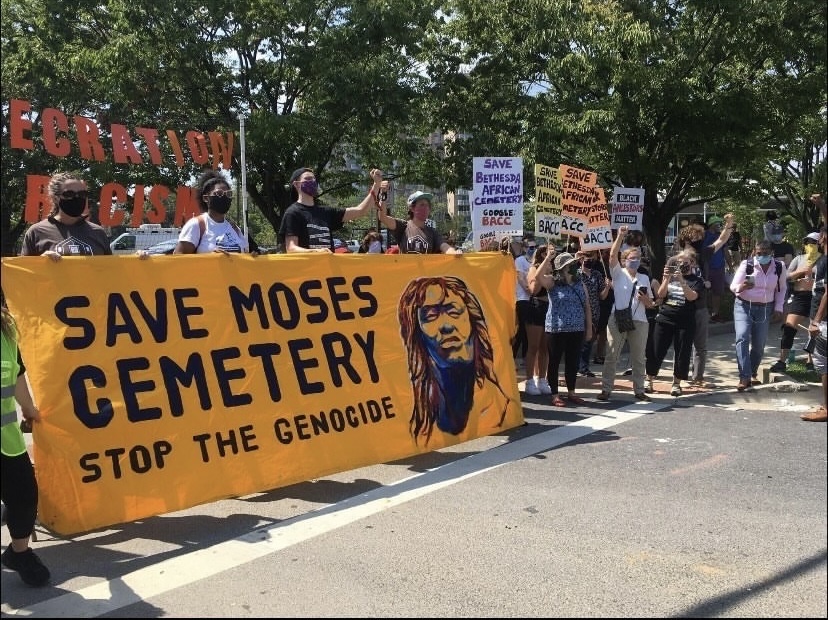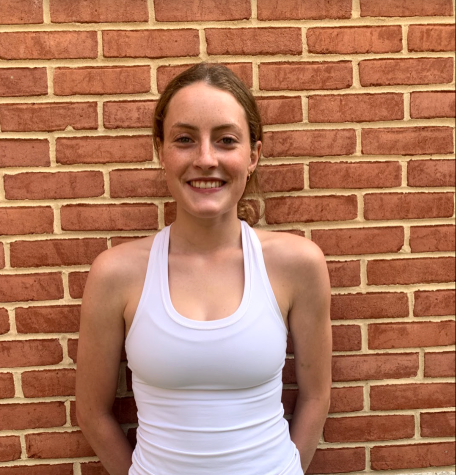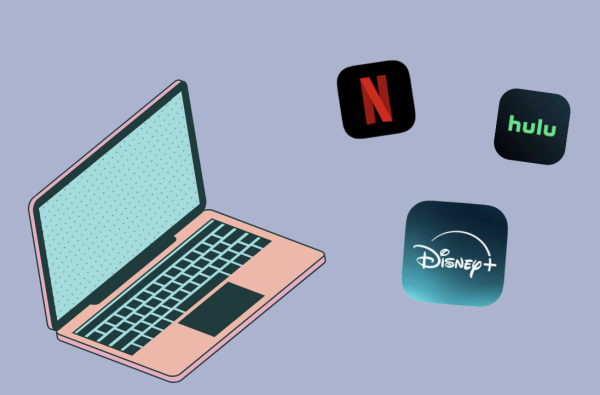Whitman alumni fight for equity, found Anti-Racist Bethesda Coalition
Members of the Anti-Racist Bethesda Coalition and the Bethesda African Cemetery Coalition stand in protest of Moses African Cemetery’s demolition. Protests occur on the side of River Road.
March 19, 2021
With signs in hand and fists held high, Ari Gutman (‘17) and fellow members of the Anti-Racist Bethesda Coalition stand firmly outside of Moses African Cemetery, Bethesda’s historic Black cemetery, protesting its destruction. The goal of these weekly protests is to bring attention to the coalition’s cause: promoting racial equity.
The Anti-Racist Bethesda Coalition is a group of young Bethesda residents advocating for social justice reform in the larger Bethesda area and, more specifically, at Whitman. The coalition’s efforts to address the lack of diversity at Whitman and the school’s racially biased curriculum mirror the current national movement to end systemic racism, Gutman said.
Gutman and Mia Carmel (’15) founded the Anti-Racist Bethesda Coalition in July of this year following the Whitman administration’s lackluster response to an open letter from former SGA President Azraf Khan (‘19). The letter, written after community members discovered racist graffiti at Whitman last June, included demands to punish the perpetrators of the hate crime and set forth a message that the Bethesda community should never tolerate acts of anti-Blackness. Carmel decided she wanted to do more to make tangible change in the community.
“I felt disappointed that there probably wasn’t going to be any follow up to the letter,” Carmel said. “So Ari and I started thinking, ‘How can we create follow up from this?’”
Carmel and Gutman started reaching out to other Whitman alumni interested in getting involved in anti-racism efforts in the community, eventually leading to the creation of the coalition.
When they founded the coalition, their goals were twofold: raise awareness about Whitman’s outdated curriculum and address the lack of staff and student diversity at their alma mater. Their main focus is education, providing community members with resources to educate themselves and take steps toward change, Gutman said.
“I wanted to create a space where Whitman alumni and current Whitman students could start learning real skills about how to create change,” Gutman said. “Building a base of people is very important for starting discussions about what our community should be doing.”
After the group started to gain a following, members began coordinating with Advocates for Black Youth, another Bethesda-based organization with similar goals. Now, both organizations work together, coordinating events to amplify Black voices and enacting change in the community through peaceful protests and online resources like petitions and articles located on the coalition’s website.
The two groups want to act as a communication line between Bethesda’s youth and the local government, so they decided in July to start having collaborative Zoom meetings. At these Zoom meetings, members of both organizations strategize together and organize actionable steps toward bringing awareness to the systemic racism in Bethesda.
“These meetings are important because it’s our time to meet and discuss face to face about what we need to plan,” Gutman said. “It’s a strategy meeting, and because so much of the organizing that we’re doing right now has to be online, we need to have these meetings to reaffirm the goals and positions of the group and then the action we need to take.”
As well as meeting on Zoom, the Anti-Racist Bethesda Coalition members also regularly attend protests in support of other organizations like the D.C.-based They/Them Collective, which combats police brutality and violence against the LGBTQ+ community. Gutman and other members of the team attend protests every Saturday night to show support for the collective’s cause.
Coalition members also stay involved in the community by providing jail support, Gutman said. Whenever a protestor is arrested, every member waits outside of the police ward where they’re being held to show support.
“Going to jail is a really dehumanizing experience, so we just show up to be there for people with hand warmers, food and a ride home if they need it,” Gutman said.
21.4% of MCPS students are Black, yet Black students make up less than five percent of Whitman’s population, according to the MCPS Office of Accountability. Despite discussions within the coalition about the lack of student and staff diversity at Whitman, the school has taken little action to fix the issue, Gutman said. To address these concerns, MCPS began studying district boundaries in 2018 with the aim of diversifying and desegregating every school.
“In my opinion, the Bethesda community has actually been quite harmful to local efforts,” Gutman said. “Many people are in opposition to the desegregation of Montgomery County Public Schools.”
The Anti-Racist Bethesda Coalition held weekly Zoom meetings, each with around 20 participants, over the spring and summer. The group transitioned to less frequent meetings because school started back up for many members, and communication efforts are now more focused on collaborating with D.C. activist groups, Gutman said.
“We’ve decided as a group that we’ll meet whenever someone wants to meet,” Gutman said. “If there’s something that we want to talk about, we immediately move to schedule our next meeting to talk directly about it.”
Any Whitman students who have an idea to voice or need a place for support are encouraged to attend the Zoom meetings, Gutman said. Harley Pomper (‘20) decided to get involved with the coalition after one of her friends found out about the organization through social media and shared information about the group with her. After working for two years with the MCPS Restorative Justice Unit, Pomper thought joining the coalition would be the perfect opportunity to make a positive impact on the Whitman community.
The coalition is split up into subcommittees, each with a different purpose. Pomper was part of the Parent Outreach and Communications committee, where she focused on advertising the coalition’s anti-racism movement to parents and students in the Bethesda area and keeping its website up to date. She led a mass flier campaign in August to advertise the organization and the different protests and events it was holding.
“While there are members who act as team liaisons, everybody is individually responsible for their own leadership on the team,” Pomper said. “We want people to feel inspired to take up actions that they’re interested in and feel motivated to complete them.”
Although the original members of the organization were all Whitman alumni, the group has expanded to include a few current Whitman students. Senior Lily Muchimba works mainly with Advocates for Black Youth, but since the groups began collaborating, Muchimba has attended the organizations’ joint Zoom meetings.
Muchimba is currently attending remote school from Zambia, so she can’t participate in the coalition’s in-person protests. However, she still goes to all of its meetings and reposts its news on her social media, she said. As with the coalition’s other partnerships, the most important goal of the collaboration between Advocates for Black Youth and the Anti-Racist Bethesda Coalition is to support each other and spread the word about different events that each group holds, Muchimba said.
“When talking about racism, it’s always best to listen to the person that has and still experiences it and give them a voice,” Muchimba said. “Racism isn’t a topic to debate — it’s something you have to observe and learn about.”
Currently, the Anti-Racist Bethesda Coalition has a partnership with the Bethesda African Cemetery Coalition, a group that protests the destruction of Moses African Cemetery, along with other Black cemeteries in the area.
“To me, this is what every Whitman student should be caring about right now,” Gutman said. “A Black cemetery is being desecrated ten minutes from where I went to high school, and I’m still kind of struggling to understand why the community has not rallied around this.”
Gutman and the BACC urge Whitman students and all Bethesda residents to take action to prevent the destruction of this piece of Black history. The BACC provides many opportunities for community involvement, including encouraging young people to join the coalition and learn how to educate others about pressing local issues. The organization wants to act as a resource for information, serving as an institution that helps people understand the importance of Black cemeteries and preserves the Black history embedded in them, Carmel said.
“It’s been amazing working with the BACC,” Carmel said. “They’re doing a really small project in the grand scheme of things, but when it’s in a place like Bethesda where people are so unaware that there’s African and Black history here, I think it’s really essential work and aligns with the mission that the Anti-Racist Bethesda Coalition originally set out to do.”
Initially, Carmel and Gutman wanted to get as many people as possible to get involved in the organization. They realized over time, though, that not everyone can make such a big commitment and have opted to create and provide educational outlets for the public instead, Carmel said.
The @blackatwhitman Instagram page was created anonymously, but the coalition has linked it on their website as an educational resource for the public. The main goal of the Instagram page is to educate the Whitman community about racist experiences that not everyone has gone through or understands.
Joining and participating in Zoom meetings is a great way to learn about and advocate for issues in the Whitman community, but any activism can make a difference, Carmel said.
“To be able to be involved with this kind of activism from a young age gives you so much perspective on the world,” Carmel said. “It’s so essential, especially now, and I don’t think high schoolers, specifically Whitman students, realize how powerful they are.”










